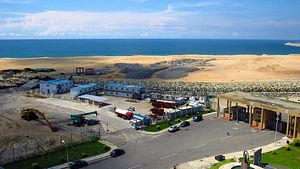Sri Lanka recently announced that a major development project, suspended since March 2015, will finally resume. The Colombo Port City Project, a $1.4 billion deal, is supported by a state-owned Chinese firm, China Communications Construction Company Limited (CCCC).
“This decision did not come as a surprise,” says Jehan Perera, executive director of the Colombo-based National Peace Council. “This was virtually a government to government agreement that could not have been rescinded without adverse consequences to Sri Lanka.”
On its project website, CCCC states the following:
Our vision is to create the ultimate ‘Gateway to South Asia’ on a solid foundation of sound business practices, leisurely human interaction and luxurious living.
To develop Colombo Port City as the symbol of emerging Sri Lanka with limitless opportunities and a promise to offer unmatched potential for business, leisure & tourism and high quality of living, not only for the local inhabitants but also for the countless numbers of the global human family from across the shores.
CCCC goes on to mention that it hopes this project will promote “Sri Lanka as the ultimate business and tourist destination center for trade, exhibitions and conferences in Asia, enabling the establishment of a Center/Hub of the marine silk road in Asia and the preferred global tourism destination in Asia.”
Ostensibly, the Sri Lankan government had suspended the project due to regulatory and environmental concerns. The lack of transparency surrounding Chinese business and investment deals in Sri Lanka was a longstanding issue when Mahinda Rajapaksa, the country’s previous president, was in power.
When he ran for the presidency, Maithripala Sirisena was critical of China’s growing influence in the country. Since coming to power in January 2015, the newly elected government, led by President Sirisena and Prime Minister Ranil Wickremesinghe, has indicated that the island nation would pursue a more balanced foreign policy.
After all, it’s no secret that – on the diplomatic, economic, and development fronts – the Rajapaksa administration became increasingly close to China. While Colombo has long maintained a good relationship with Beijing, policymakers in both India and the United States grew more and more concerned about the elevation of strategic ties between Sri Lanka and China under Rajapaksa’s watch.
Nonetheless, money talks. Sri Lanka is in no position to turn its back on Chinese investment or alienate Beijing. “The Port City decision shows that it [the Sri Lankan government] is aware that it has to balance its relations with the international community as a whole,” says Perera.

































